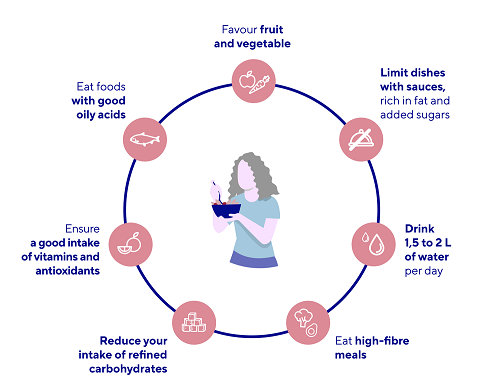Living with OA of the knee more comfortably thanks to diet

Making a few changes to your diet can help relieve the symptoms of osteoarthritis of the knee (or gonarthrosis) and slow down its progression. Improving the balance of your diet and favouring joint-protecting foods is easy and really helps.
Overweight and obesity increase mechanical stresses on the knees and are often accompanied by metabolic disorders that promote inflammation and are bad for cartilage health. On the other hand, some diets and eating habits are known to help protect the joints.
A good-quality, balanced diet plays a crucial role in maintaining your ideal weight, general well-being and joint health. High cholesterol levels may be associated with an increased risk of osteoarthritis(1). It is therefore recommended to reduce your saturated fat intake (particularly from meat, delicatessen meat products, butter and cheese).
It is also recommended to:
• favour plant-based foods: fresh vegetables, fresh fruit and wholegrain cereals, which are high in vitamins and fibre;
• favour oily fish (salmon) and lean meats (chicken, veal);
• reduce your intake of refined carbohydrates, which promote a state of slight general inflammation in the body.
In people who are overweight or obese, scientific studies have shown that a diet enabling even moderate weight loss reduces the pain, inflammation and physical disability associated with osteoarthritis of the knee(2). If you would like to lose weight, seek advice from your doctor or a nutritionist.
Some fatty acids may promote cartilage-damaging inflammation, while others, such as the famous “omega 3s” seem to have a protective and positive effect in osteoarthritis of the knee(3). Eating oily fish twice a week increases your omega 3 intake.
A number of recent studies have demonstrated the benefits of a “Mediterranean-style” diet, based on fruit and vegetables and olive oil, low in animal fat and high in fibre(4)(5). Following this type of diet for just 4 months may help reduce inflammation and improve knee-bending capacities in people with osteoarthritis. It may also reduce pain and stiffness, and even depression related to the disease.
While all vitamins are important to stay healthy, some deficiencies are particularly bad for the joints. Studies in this field have concluded that:
• low vitamin D levels may promote the progression of osteoarthritis of the knee(1);
• vitamin K deficiency may reduce cartilage thickness and increase the frequency of joint damage in the knee(1).
Vitamin D is primarily found in cod liver, oily fish and foods fortified with vitamin D (oil, dairy products) and vitamin K in leafy green vegetables (all lettuces, for example).
Don’t forget to drink plenty fluids to flush out toxins: favour still water, herbal teas, green tea (high in antioxidants) and fresh unsweetened fruit juices, preferably red berries, pineapple, tomato or citrus fruits(6).
If you have any questions, ask your doctor for advice.
1. Rayman MP. Diet, nutrition and osteoarthritis. BMC Musculoskelet Disord. 2015;16(Suppl 1):S7. Published 2015 Dec 1. doi:10.1186/1471-2474-16-S1-S7
2. Zhang W, Moskowitz RW, Nuki G, Abramson S, Altman RD, Arden N et al. OARSI recommendations for the management of hip and knee osteoarthritis, Part II: OARSI evidence-based, expert consensus guidelines. Osteoarthritis Cartilage 2008; 16:137- 62.
3. Hughes, Emmett. (2016). Nutritional Protocol for Osteoarthrosis (Degenerative Joint Disease). Journal of Clinical Nutrition & Dietetics. 02. 10.4172/2472-1921.100032.
4. Dyer J, Davison G, Marcora SM, Mauger AR. Effect of a Mediterranean Type Diet on Inflammatory and Cartilage Degradation Biomarkers in Patients with Osteoarthritis. J Nutr Health Aging. 2017; 21(5):562-566.
5. Veronese N, Stubbs B, Noale M, Solmi M, Luchini C, Maggi S. Adherence to the Mediterranean diet is associated with better quality of life: data from the Osteoarthritis Initiative. Am J Clin Nutr. 2016 Nov;104(5):1403-1409.
6. Arthritis Foundation: Best beverages for Arthritis